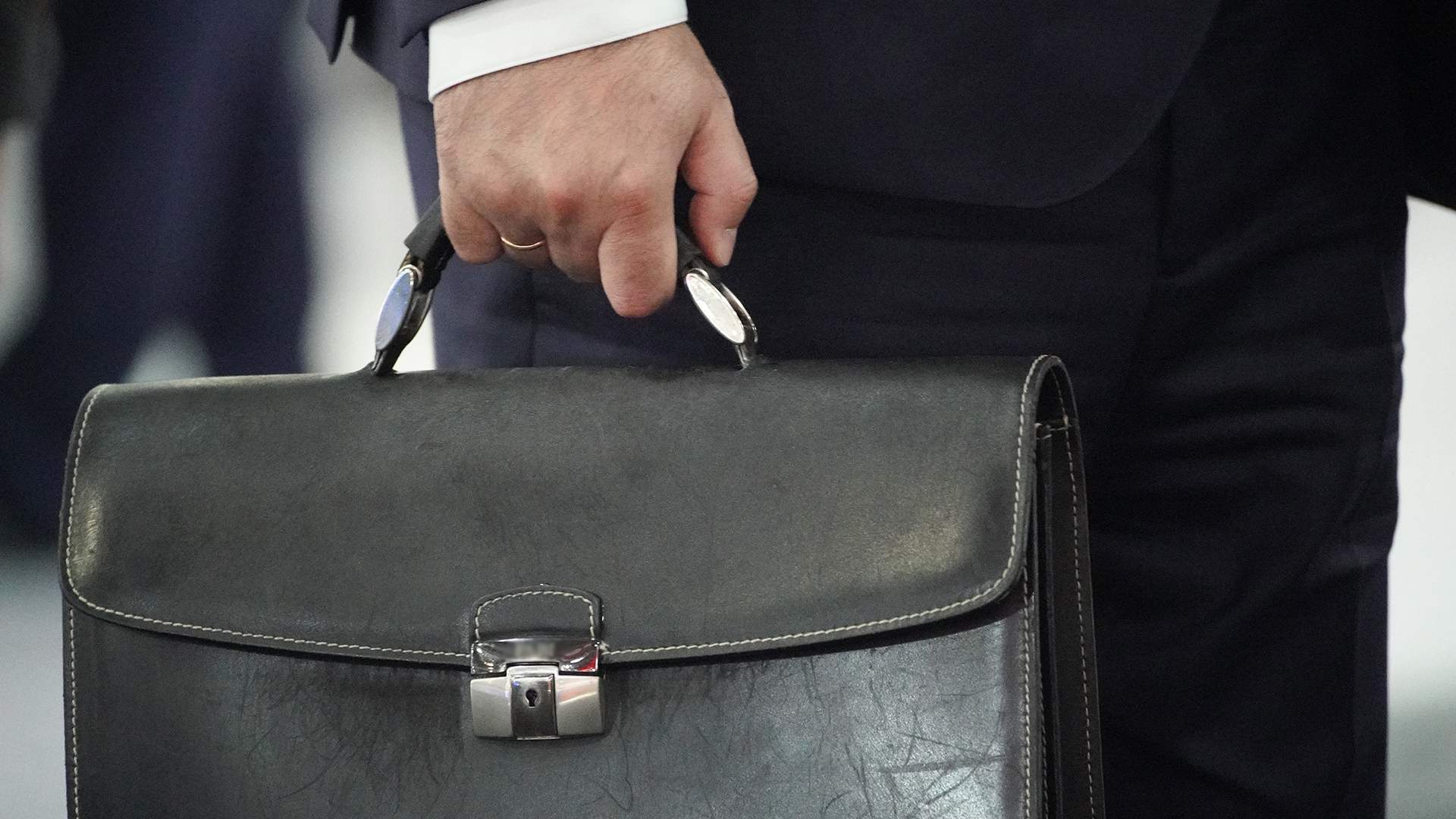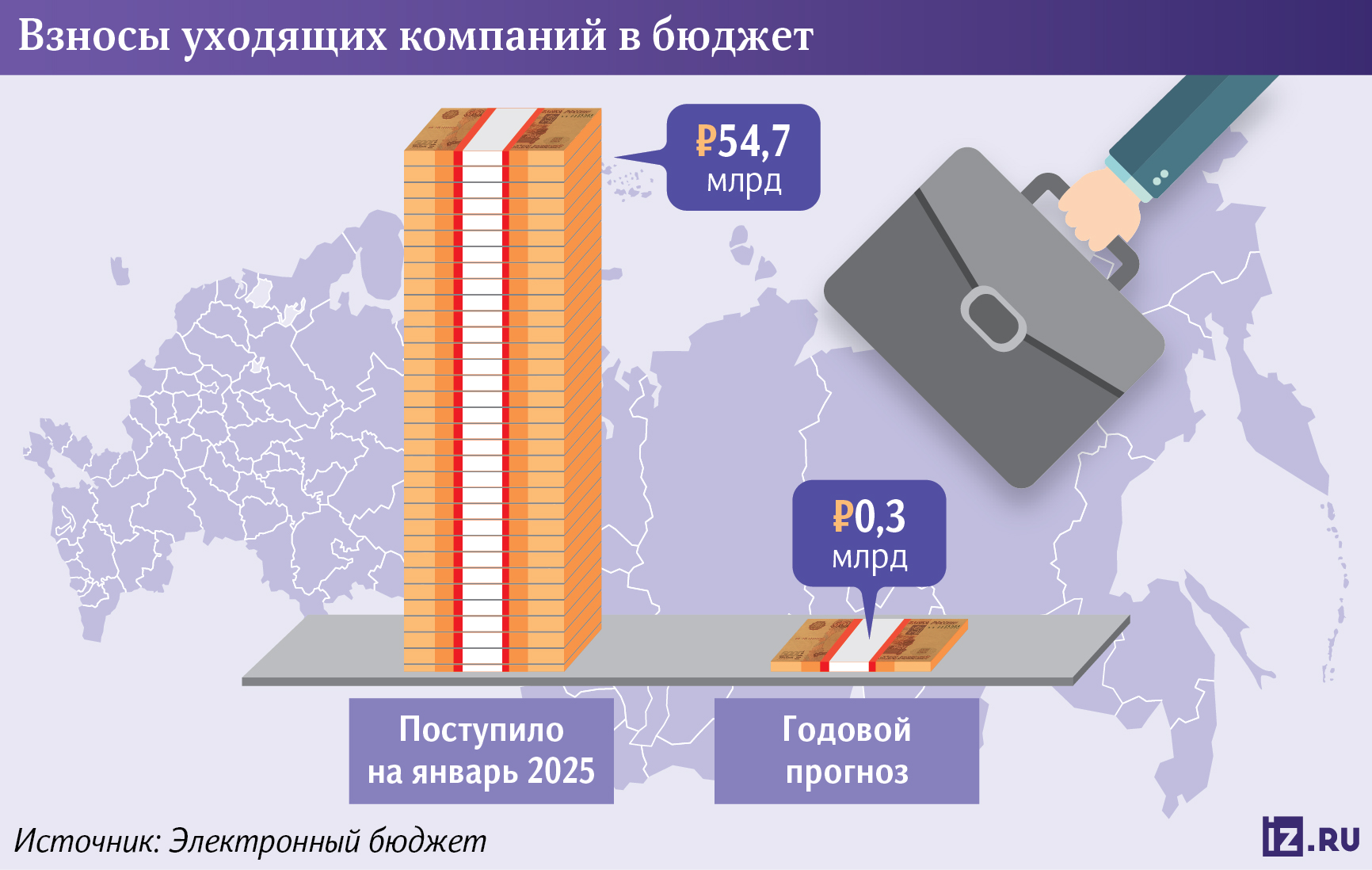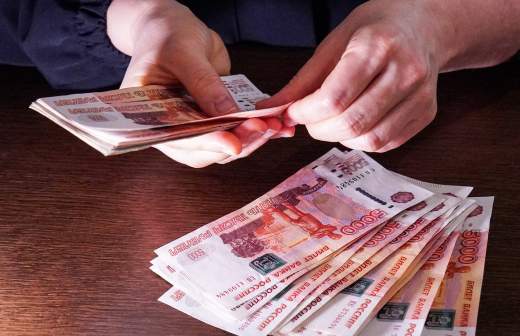- Статьи
- Economy
- Up to what levy: outgoing business contributions in January exceeded the annual plan by 185 times
Up to what levy: outgoing business contributions in January exceeded the annual plan by 185 times

Contributions from businesses leaving Russia exceeded the annual plan 185 times in January alone - since the beginning of 2025, the treasury has received 55 billion rubles, according to Izvestia. This year there have been no high-profile sales yet - now mostly the deals started in 2022-2024 are being finalized. For example, only Carlsberg, which left Russia at the end of last year, brought the budget about 10 billion rubles, experts estimated. Although the authorities do not lay in the treasury expectations for the departure of companies, this year the process is likely to continue, but not so large-scale. In 2025, for example, the Austrian Raiffeisenbank and the American Goldman Sachs may sell their business. However, they announced such plans three years ago, but they are still working here.
How much revenue the outgoing companies have brought to the budget
In the first month of 2025, the treasury received 54.7 billion rubles in gratuitous payments from non-state organizations, according to the operational data of the Electronic Budget as of January 28 (Izvestia has studied them). At the same time, the forecast for the whole year for this item is 185 times lower - 295 million rubles. This refers to income related to the sale of assets by foreign companies, the explanatory note to the financial plan for 2025-2027 specifies. The editorial board has sent an inquiry to the Ministry of Finance.
According to the "Electronic budget", the receipts from the contributions of outgoing companies for January 2025 have already overtaken last year's figure for the same period by 2.5 times. Earlier "Izvestia" wrote that for almost the entire 2024th, the fees from foreign businesses exceeded the original plan for the year 74 times and reached 156 billion. However, then the original forecast was more ambitious than this year - 2 billion rubles.
In December 2022, the authorities introduced a commission for the sale of Russian business by non-residents from unfriendly countries. Such transactions must be approved by the government commission on foreign investments - and they will not be approved without a voluntary contribution. In addition, according to the rules, outgoing investors in the sale of assets must provide at least 60% discount from the value determined by an independent appraisal.
The requirements for outgoing companies have been consistently tightened. In the fall of 2023, the contribution was raised from 10% to 15% of the asset's market value, and in October 2024 it was raised to 35%. In addition, according to the latest rules, if the value of the transaction exceeds 50 billion rubles, it must be made only with the consent of the president.

- At the same time, the schedule for transferring funds to the budget is interesting: 25% must be sent within a month from the date of the transaction, 5% - within a year, and the remaining 5% - within the next two years. This means that 10% of the funds will not be received immediately, which makes it difficult to accurately forecast the figure. This is probably why some of the additional payments from past sales occurred in January 2025," explained Artem Lyukshin, Associate Professor of the Department of State and Municipal Finance at Plekhanov Russian Economic University.
Which companies are leaving Russia
Some foreign brands that ceased operations as early as 2022-2023 completed the sale of their Russian assets only in 2024. Among them, for example, food company Danone, printer and computer manufacturer Hewlett-Packard (HP), automobile manufacturer Hyundai, the largest manufacturer of construction and mining equipment Caterpillar, French "daughter" of Auchan company Ceetrus, producer of consumer goods Unilever.
One of the biggest deals of last year was the departure of the brewing company Carlsberg. At the end of 2024 it sold the company Baltika for 34 billion rubles to the Russian JSC VG Invest. At the same time, the corporation decided to leave the Russian Federation in 2022, and signed an agreement on the deal in June 2023. A month after that, Russian President Vladimir Putin signed a decree on the transfer of the company to the temporary management of Rosimushchestvo, and in December 2024, he removed the assets from the control of the service. This opened a legal possibility for the sale of the brewery.
Since the size of the voluntary contribution is 35% of the market value of the asset, and only part of it should be transferred at once (25%), Carlsberg was already obliged to pay 8.5 billion rubles to the Russian budget, Freedom Finance Global analyst Vladimir Chernov calculated. The experts of the Plekhanov Russian Economic University, in turn, estimated the size of the entire gratuitous fee from the company at 12 billion. However, it is not a fact that the company transferred all this amount at once - part of it could have entered the treasury just at the beginning of 2025.
The bulk of the companies that wanted to leave the Russian market have already done so over the past three years. However, some of them continue to confirm such plans. For example, this year Austrian Raiffeisen Bank International (RBI) also confirmed its intention to leave Russia, Vladimir Chernov recalled. This happened against the backdrop of failures in legal proceedings in Russia, which cost the bank €840 million, reducing the group's profits in the country by 35%.
"We are taking steps to exit Russia, where we are very likely to sell a majority stake in Raiffeisenbank," a group spokesman told Reuters.
However, RBI announced its intention to reduce business in Russia back in 2022. In the spring of 2023, the company said it was considering two scenarios: sale of a subsidiary or withdrawal of this asset from RBI. The group tried to sell a 60% stake in its Russian division, but a court imposed a ban on the transfer of the subsidiary's shares, blocking the possibility of the deal. However, the bank is also taking other steps to wind down its business - in particular, it has already reduced the number of branches in Russia by a third.
Also in late January, the president approved the sale of 100% of the Russian Goldman Sachs Bank (owned by the U.S. company Goldman Sachs) to the Armenian Baltschug Capital. At the same time, the company reported about the decision to curtail its business in Russia in 2022.
In addition, some Chinese manufacturers may leave Russia in 2025 - but not because of sanctions, but because of low profitability of sales, predicts Vladimir Chernov.
At the end of January, the media reported that the automobile brand SWM (owned by the Chinese Shineray Group) may leave Russia in the near future. Marketing activity of the representative in the Russian Federation stopped in the middle of 2024. Now the company is promptly emptying its warehouses.
In December 2024, the analytical agency "Autostat" reported that the market expects a number of Chinese brands to leave Russia. Thus, this year, according to the forecasts of representatives of large car dealers, Livan, Kaiyi, Foton may leave Russia with a high probability. The reason is low profitability.
Why revenues from leaving companies exceed the forecasts
Judging by the dynamics of recent years, a very modest plan for revenues from voluntary contributions of departing foreign companies is budgeted - probably because it is impossible to predict in advance who will sell assets during this period, said Olga Belenkaya, Head of Macroeconomic Analysis at Finam. But the actual proceeds turn out to be significantly higher.
At the same time, the number of companies leaving is decreasing, emphasized Artem Lyukshin from Plekhanov Russian Economic University. Besides, today the terms of such deals are tougher and may bring even greater losses to the company.
- The income forecast was initially made on the assumption that foreigners would not sell assets at a large discount. Nevertheless, owners from unfriendly countries put pressure on business, which forms conditions for organizations to leave," explained Andrei Barkhota, PhD in Economics.
In addition to the growth of the rate of the fee itself, budget revenues from foreigners were also affected by the increase in the key rate and future expectations on its dynamics, says Evelina Gomonko, associate professor at the Faculty of Economics of PFUR. In conditions when the interest on deposits reaches 20-30%, companies have become concerned whether their assets will be worth less and whether buyers will remain interested in them, she explained. This also prompted foreign brands to leave the Russian market.
How the departure of foreign brands affects the Russian economy
- Of course, when large companies leave, the budget loses part of its tax revenues and the number of jobs is reduced. However, a number of foreign assets have been transferred to Russian residents who continue to provide revenue to the treasury, produce goods and services, and hire citizens," said Artem Lyukshin from Plekhanov Russian Economic University.
The departure of business forces to accelerate the processes of import substitution and parallel imports, but this accelerates prices, added Vladimir Chernov of Freedom Finance Global.
In addition, the proceeds received from the sale of assets after the payment of dues must be converted into currency and withdrawn from the country - this puts pressure on the ruble exchange rate, said Evelina Gomonko of PFUR. However, the reciprocal restrictions on currency export, as well as the reduced number of banks that can conduct such operations, have led to the fact that the money from the sale of assets "hangs" in special accounts, she recalled.
At the same time, the departure of foreign brands has freed up market niches in favor of domestic companies, the expert added.
- At the same time, 2025 promises the return of foreign brands to the Russian market, as well as the emergence of new players and names. These will be both Russian and Asian organizations. UAE companies are actively moving in this direction, - says Evelina Gomonko.
At the end of the year, budget revenues from the companies that are leaving may exceed 200 billion rubles, predicts Vladimir Chernov. Artem Lyukshin, on the contrary, believes that the amount will decrease compared to 2024.
Переведено сервисом «Яндекс Переводчик»







